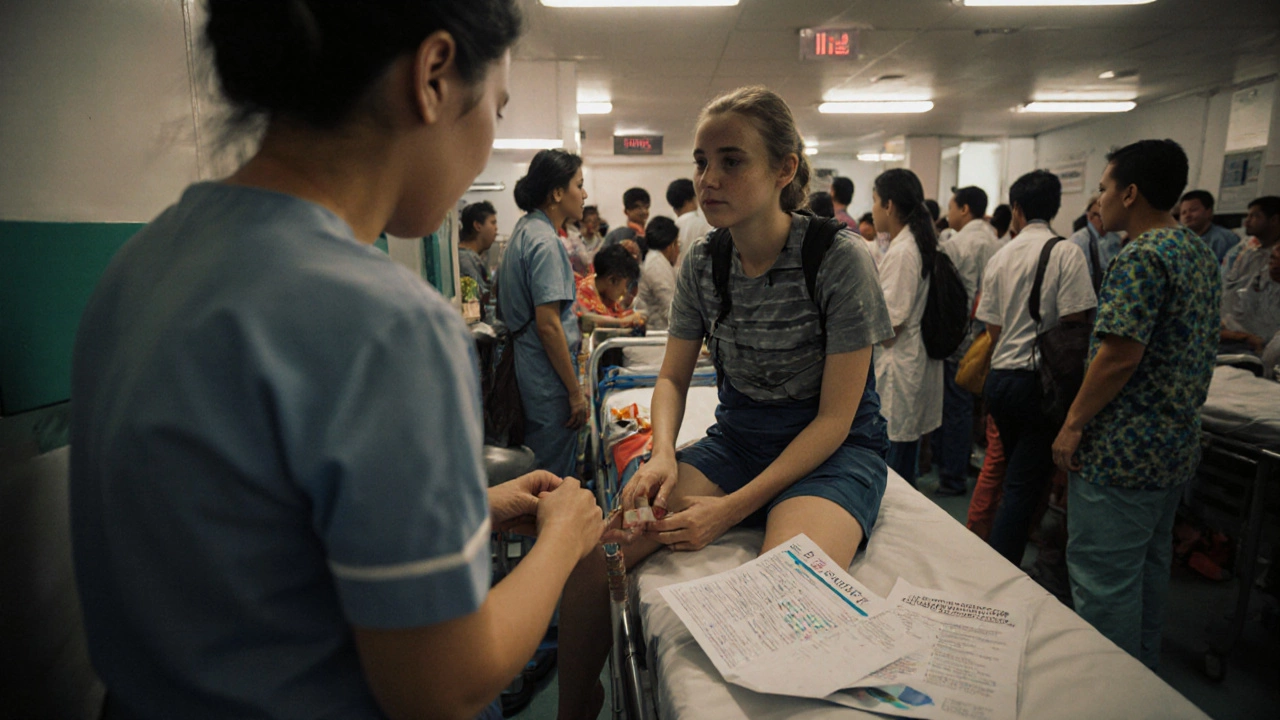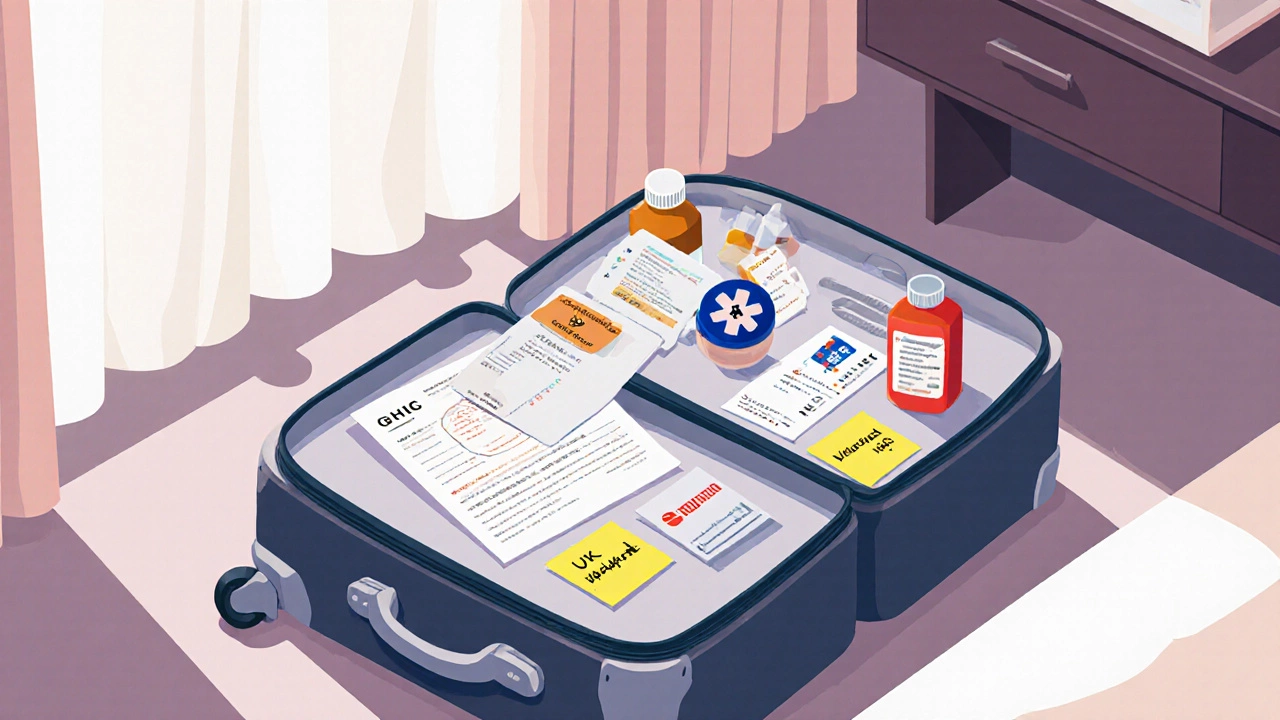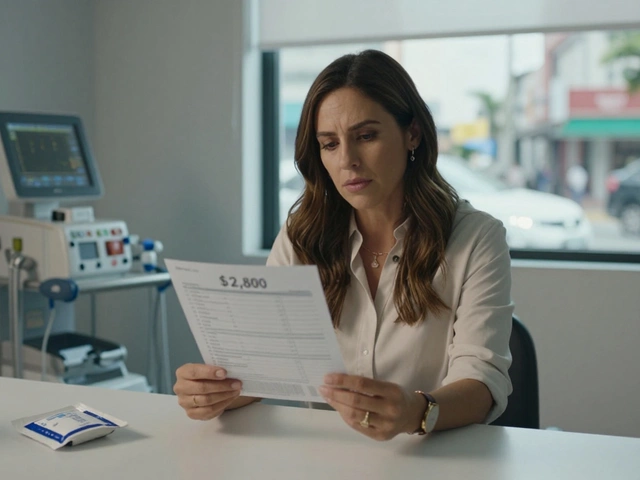Medical Emergency Cost Calculator
Calculate Your Emergency Costs
Estimate medical costs for emergencies abroad based on your destination and care type.
If you’re traveling outside the UK and suddenly feel unwell - chest pain, a bad fall, sudden vomiting, or trouble breathing - you’re not alone. Thousands of UK residents face medical emergencies abroad every year. The good news? You’re not completely on your own. The bad news? Without the right prep, you could end up paying thousands of pounds for care that should’ve been covered.
What’s covered when you’re overseas?
If you’re a UK resident, your access to emergency care abroad depends on two things: your location and whether you have the right documents. In EU countries, Iceland, Liechtenstein, Norway, and Switzerland, your Global Health Insurance Card (GHIC) gives you access to state-provided healthcare at the same cost as a local resident - often free or reduced. It’s not travel insurance. It won’t cover repatriation, private clinics, or lost medication. But it will cover emergency treatment like a broken bone, severe infection, or heart attack.
If you’re going to a country outside this list - say, the US, Canada, Australia, or Thailand - your GHIC won’t help at all. That’s where proper travel insurance becomes non-negotiable. Without it, a single hospital stay in the US can cost over £10,000. In Thailand, it might be £2,000. Even in places with lower costs, ambulance fees and specialist care can quickly add up.
What to do the moment you need help
First, don’t panic. Second, don’t go straight to a private clinic unless you’re absolutely sure you can pay. In most countries, emergency rooms in public hospitals are the safest and cheapest option for urgent care. Here’s what to do step by step:
- Call the local emergency number. In most EU countries, it’s 112. In the US, it’s 911. In Australia, it’s 000. Know it before you go.
- If you have a GHIC, show it. If you don’t, explain you’re a UK resident. Staff will still treat you - but you’ll need to pay later unless you have insurance.
- Don’t sign anything without understanding it. If you’re given a bill, ask for an itemized breakdown. Never agree to a payment plan on the spot.
- Contact the UK Foreign Office. Call +44 20 7008 1500 or use their emergency number abroad: +44 20 7008 6000. They can help you find local doctors, contact family, or arrange funds if you’re destitute.
- Notify your travel insurer immediately. Most policies require you to call within 24-48 hours. Delaying this can void your claim.
GHIC vs. travel insurance: what’s the difference?
Many people think the GHIC is enough. It’s not. Here’s what each covers - and what they don’t.
| What’s Covered | GHIC | Travel Insurance |
|---|---|---|
| Emergency hospital care in EU/EEA | Yes | Yes |
| Emergency care outside EU/EEA | No | Yes (if policy includes it) |
| Ambulance transport | Usually yes | Yes |
| Repatriation to UK | No | Yes (standard in most policies) |
| Private hospital rooms | No | Often yes |
| Lost or stolen prescription meds | No | Yes (if you have the right add-on) |
| Dental emergencies | Only urgent treatment | Usually up to £500-£1,000 |
Travel insurance also covers things GHIC never touches - like if you miss your flight because you’re in the hospital, if your luggage gets stolen, or if a family member needs to fly out to be with you. These aren’t luxuries. They’re real costs. One traveler in Thailand had to pay £3,200 to fly his wife home after she broke her leg. His insurance covered it. He didn’t have insurance? He sold his laptop to pay.

How to get the right insurance
Not all travel insurance is the same. Cheap policies often cut corners. Look for these must-have features:
- Medical emergency cover of at least £2 million
- Repatriation included - not optional
- Dental emergency coverage up to £1,000
- Cover for pre-existing conditions (if you have any)
- 24/7 emergency helpline with UK-based support
Companies like Allianz, AXA, and Staysure offer policies tailored for UK travelers with chronic conditions. If you’re over 70, expect to pay more - but don’t skip it. A 75-year-old in Spain had a stroke. Without insurance, the hospital bill was £17,000. With it? £0 out of pocket.
Always read the fine print. Some policies exclude activities like skiing, scuba diving, or hiking above a certain altitude. If you’re planning an adventure trip, get an adventure travel policy. It’s a few pounds more - but worth it.
What to pack before you leave
Don’t wait until you’re in a foreign ER to realize you forgot the basics. Here’s your pre-travel checklist:
- Your GHIC or EHIC (if still valid - check expiry date)
- A printed copy of your travel insurance policy and emergency number
- A list of your medications, dosages, and your doctor’s contact info
- Any medical conditions written in the local language (use a translation app or carry a card)
- At least a week’s extra supply of prescription meds
- Emergency contact details for next of kin
Many pharmacies abroad won’t fill a UK prescription unless it’s in their system. Having a doctor’s note - even a simple one printed from your GP’s portal - can save hours of confusion.
What happens if you can’t pay?
Emergency care is never denied in the EU or most developed countries - but you’ll get billed later. If you can’t pay on the spot, ask for a payment plan. Don’t ignore the bill. Unpaid medical bills can lead to collection agencies, credit damage, or even legal issues if you return to that country.
If you’re truly stuck, the UK Foreign Office can help. They can’t pay your bill, but they can contact your family, help you access emergency funds from your bank, or arrange a loan against your assets. This isn’t a handout - it’s a last resort.

What to do after you return
Once you’re back in the UK, keep all your medical records. Send them to your GP. If you were treated abroad for something serious - like pneumonia, a heart issue, or a major injury - your GP needs to know. You might need follow-up scans or medication adjustments.
Also, file your insurance claim as soon as possible. Most insurers require claims within 30 days. Keep receipts, doctor’s notes, and hospital discharge summaries. Even a photo of the bill works if you don’t have the original.
Common mistakes travelers make
- Thinking the GHIC covers everything - it doesn’t
- Buying the cheapest travel insurance without checking the fine print
- Forgetting to carry physical copies of documents (phone batteries die)
- Waiting to call the insurer until after they’re home - many policies require notification within 24 hours
- Assuming their NHS coverage follows them abroad - it doesn’t
One traveler in Portugal got food poisoning and spent three days in hospital. He didn’t have insurance. He thought the GHIC would cover it. It did - for the hospital stay. But he didn’t realize the ambulance ride cost €450. He had to pay it out of pocket. He never traveled without insurance again.
Final advice: Plan ahead, don’t panic
Medical emergencies abroad are scary - but they’re also preventable. Get your GHIC. Get proper travel insurance. Pack your meds and documents. Know the emergency number. Talk to your GP before you leave if you have chronic conditions.
Most people who end up in serious trouble abroad didn’t have a plan. They assumed it wouldn’t happen to them. It happens to thousands every year. Don’t be one of them. The cost of being prepared is a few pounds. The cost of being unprepared? Could be your savings, your health, or worse.
Does the NHS cover me if I have a medical emergency abroad?
No, the NHS does not cover medical costs abroad. The NHS only pays for treatment within the UK. However, UK residents can use their GHIC to access state-provided emergency care in EU countries, Iceland, Liechtenstein, Norway, and Switzerland at the same cost as locals - which is often free. Outside these areas, you’re on your own unless you have travel insurance.
Is the GHIC the same as the EHIC?
The GHIC replaced the EHIC for UK residents after Brexit. Both cards work the same way in eligible countries, but the GHIC is now the only valid card for new applicants. If you still have a valid EHIC, you can use it until it expires. But if it’s expired or lost, you must apply for a GHIC. You can get one for free from the NHS website.
Can I use my travel insurance for non-emergency care abroad?
Most travel insurance policies only cover emergency treatment - not routine check-ups, prescription refills, or elective procedures. If you need a non-emergency visit, like for a persistent cough or a skin rash, you’ll usually have to pay out of pocket. Some premium policies include limited coverage for urgent care (not emergency), so check your policy wording. Always call your insurer first before seeing a doctor for anything that isn’t life-threatening.
What if I need to be flown back to the UK?
Repatriation - being flown back to the UK for medical care - is one of the most important benefits of travel insurance. It’s not covered by the GHIC. Most policies include this, but only if you have medical clearance. The insurer will arrange a medical flight with a nurse or paramedic onboard. Without insurance, this can cost over £15,000. Never assume your credit card’s travel insurance covers it - many don’t, or cap it at £1,000.
Do I need travel insurance if I’m only going to Europe?
Yes. The GHIC covers emergency hospital care in Europe, but it doesn’t cover ambulance rides, private clinics, repatriation, or lost medication. Many European countries charge for ambulance transport - even if hospital care is free. A broken ankle in France might cost €300 just to get to the hospital. Travel insurance covers all of this. Plus, it protects you if you miss your flight or need to cancel your trip due to illness.




